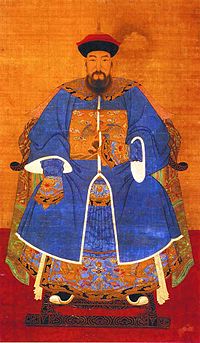
Back Hong Chengchou Italian 洪承疇 Japanese 홍승주 (청나라) Korean Хун Чэнчжоу Russian Hồng Thừa Trù Vietnamese 洪承畴 WUU 洪承疇 Chinese 洪承疇 ZH-CLASSICAL 洪承疇 ZH-YUE
Hong Chengchou | |
|---|---|
| 洪承疇 | |
 | |
| Grand Secretary of the Wuying Hall | |
| In office 1658–1661 | |
| Grand Secretary of the Palace Academy for the Advancement of Literature | |
| In office 1653–1658 | |
| Grand Secretary of the Palace Secretariat Academy | |
| In office 1644–1653 | |
| Viceroy of Ji–Liao | |
| In office 1639–1641 | |
| Preceded by | Wu Aheng (viceroy of Ji–Liao–Baoding) |
| Succeeded by | Yang Shengwu |
| Personal details | |
| Born | 16 October 1593 Nan'an, Fujian, Ming China |
| Died | April 3, 1665 (aged 71) Nan'an, Fujian, Qing China |
| Education | jinshi degree in the Imperial Examination |
| Occupation | Official |
| Courtesy name | Yanyan (彥演) |
| Art name | Hengjiu (亨九) |
| Posthumous name | Wenxiang (文襄) |
| Signature | |
Hong Chengchou (Chinese: 洪承疇; Pe̍h-ōe-jī: Âng Sîng-tiû; 1593–1665), courtesy name Yanyan and art name Hengjiu, was a Chinese official who served under the Ming and Qing dynasties. He was born in present-day Liangshan Village, Yingdu Town, Fujian Province, China. After obtaining the position of a jinshi (進士; successful candidate) in the imperial examination in 1616 during the reign of the Wanli Emperor, he joined the civil service of the Ming Empire and served as an official in Shaanxi. During the reign of the Chongzhen Emperor (r. 1627–1644), he was promoted to Minister of War and Viceroy of Jiliao (薊遼; an area which included parts of present-day Shandong, Hebei and Tianjin). In 1642, he surrendered and defected to the Manchu-led Qing Empire after his defeat at the Battle of Songjin. He became one of the Qing Empire's leading Han Chinese scholar-politicians. While he was in office, he encouraged the Manchu rulers to adopt Han Chinese culture and provided advice to the Qing government on how to consolidate its control over the former territories of the fallen Ming Empire. Apart from Dorgon and Fan Wencheng (范文程), Hong Chengchou was regarded as one of the most influential politicians in the early Qing dynasty. However, he was also villainised by the Han Chinese for his defection to the Qing Empire and for his suppression of the Southern Ming dynasty (a short-lived state formed by remnants of the fallen Ming Empire).